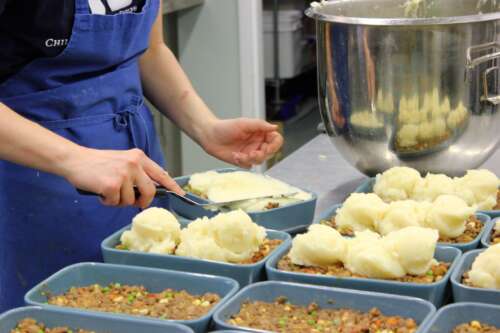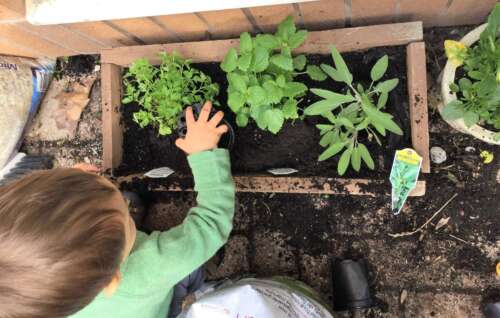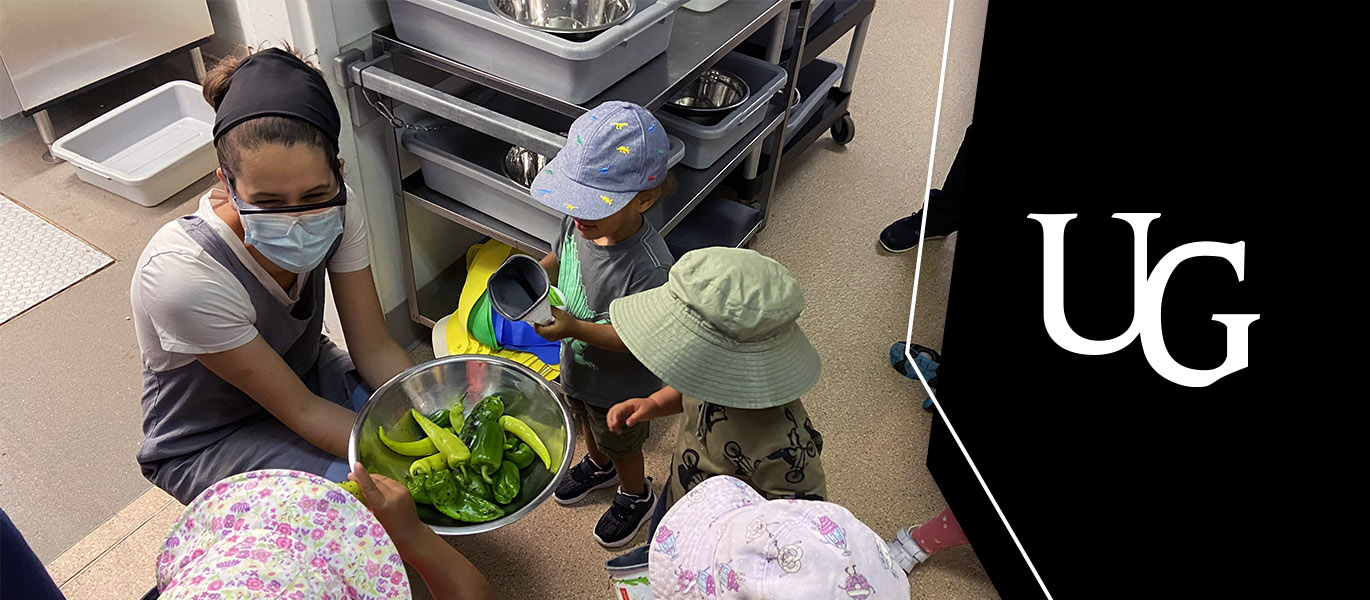
The toddlers and preschoolers at the University of Guelph’s Child Care and Learning Centre (CCLC) have recently been learning more than just their ABCs and 1-2-3’s. They’ve also been learning about split peas and tofu curries.
The on-campus early learning lab school switched to a fully plant-based menu in 2020. Since then, not only have meal and snack times been made safer and more efficient, but the centre has vastly reduced its carbon footprint.
A recently commissioned CCLC food sustainability report revealed that removing animal-based products from the menu cut the centre’s monthly carbon footprint by nearly 65 per cent.
The report, completed by Foodsteps, estimates the centre now saves more than 1,900 kilograms of carbon dioxide (CO2) a month compared to when it had meat and dairy on the menu – the CO2 emission equivalent of driving 7,800 kilometres.
“This is great news, and we are very proud that we’ve been able to reduce our footprint this way,” said CCLC director Valerie Trew.
But the greatest benefit of switching to a fully plant-based menu has been transforming what was once the most stressful part of the day for CCLC staff, said Trew.
Removing animal products from menu reduced mealtime stress
Mealtimes at the centre were challenging because of the children’s varied dietary needs and food allergies, including some that could cause anaphylaxis. (Almost all the food allergies in the children in recent years were tied to dairy and eggs.) Some children required a halal diet; others were vegetarian or vegan.

Creating different variations of the same meal to accommodate the restrictions, then labelling each portion and going through several checks in the classroom to ensure each child got the right meal was more than just time-consuming, said Trew: “It was stressful for our educators and kitchen staff.”
What’s more, the issue of inclusion was often coming up, she added.
“Those children with serious dairy allergies were having to sit at separate tables away from the others for their own safety and that wasn’t great for creating a sense of belonging.”
Seeking a solution, Trew wondered if it might lie in eliminating meat and dairy altogether.
“We realized if we removed animal products, we’d solve nearly all of it,” said Trew. “Almost everyone could eat a plant-based diet and it would make mealtimes so much more efficient if everyone could eat the same meal.”
In late 2019, the centre staff began informing prospective parents about moving toward a plant-based menu. But then the pandemic lockdowns began and the child care centre was closed.
Trew took that time to learn more about plant-based nutrition. She signed up for an online certificate, along with child care cook Elyse Serediuk, through eCornell – the only place then offering such certification.
Now, more than two years later, the centre’s children and families love the new plant-based menu. Serediuk’s tomato coconut curry has been a big hit. So have the red lentil pizza and make-your-own black bean wraps. Chia pudding and date and oat “power balls” are regular favourites for snack time.
“Our rice jollof is also popular and I’ve had a lot of requests from families for that recipe,” she said. “We regularly ask our families for suggestions and recipes. That was one of them and it has become a centre favourite.”
New menu prompts further sustainability changes
The new menu also prompted the centre to look at other ways to improve sustainability, such as buying dry goods from a local bulk store.
“Since we are spending less of our budget on meat, dairy and eggs, we can now support local suppliers,” said Serediuk. That includes local maple syrup, honey from the U of G Honey Bee Research Centre and baked products from Creelman Bakery on campus.
Parents appreciate knowing their kids are getting their fruit and vegetables during the day as well as learning about how their food is grown through the centre’s community garden.
“We grow some produce and herbs in our own garden,” said Trew.” So we use that to connect the kids with the land, getting them to help with planting, watering and harvesting.”
Trew, who went vegan a few years ago as she was looking into the benefits of plant-based food for the centre, now regularly conducts online seminars for other education centres considering switching their menus.
This past January, U of G began offering a plant-based nutrition certificate of its own – the first of its kind at a Canadian university – and Trew is leading a course called Implementing a plant-based menu in an institutional setting.
The team has learned that offering a plant-based menu isn’t that complicated and provides so many benefits. “The need for efficiency, safety and inclusion is what drove this switch at first,” said Trew, “but we’ve learned it connects to our mission of caring for children and to the University’s larger mission of improving life and sustainability. It’s small steps like this that can make a difference.”
Elsewhere on campus, the University continues to provide a full spectrum of food options at its other dining outlets, including in all student housing residences, the University Centre, and its full-service restaurants.
Contact:
Valerie Trew
cclc@uoguelph.ca
